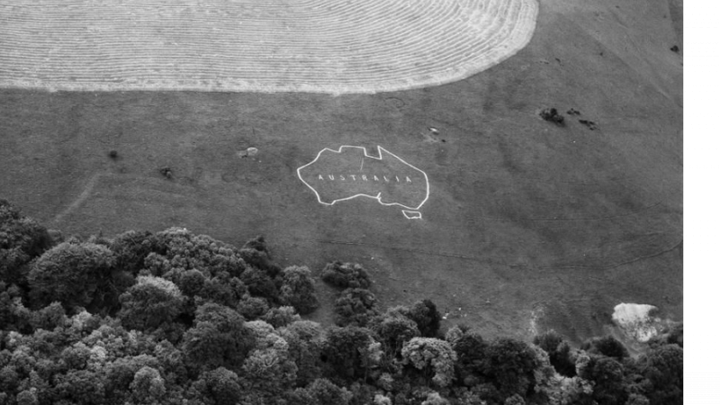
WW1 Map of Australia Chalk Badge
Donation protected
The Map of Australia
The Map of Australia is a huge chalk badge carved into the downland near the village of Compton Chamberlayne in Wiltshire, UK. It was created by Australian soldiers staying at Hurdcott Camp during the First World War.
Scheduled Ancient Monument
The Map is a hugely important feature in the landscape and is a Scheduled Ancient Monument. In the past, it has gone through periods of decline and restoration, but at present, since maintenance funding was withdrawn in 2005, the Map is now in a perilous condition. It can no longer be seen on the hillside and is only just visible from the air. The Map was listed in Historic England's 'Heritage at Risk' register published October 2017. If action is not taken now, the Map of Australia will be lost forever.
Our Aims
The Map of Australia trust was set up in 2017 with the aim of restoring the badge. We are all volunteers, working with local landowners, Historic England and the Australian Army with the aim to restore the badge within the First World War Centenary years.
The Costs
To restore the badge we need chalk. The chalk can be sourced locally at no cost from a nearby quarry but we need at least 60 tonnes and the cost comes in hiring in specialist equipment to excavate and mechanically screen it. We have the assistance of a local farmer to move it to the top of the hill. We will re-dig the shape of the Map, then use the chalk to backfill, restoring the badge in accordance with Historic England's advice. For some funny reason our volunteer work parties are more fun in the summer so we would like to get the chalk mined soon so we can complete the bulk of the restoration in Summer 2018.

Background History
During the First World War, farmland near the village of Compton Chamberlayne, Wiltshire became a large military camp known as Hurdcott Camp. It was one of three large camps located between the villages of Compton Chamberlayne and Sutton Mandeville and provided vital training and convalescent facilities. The name Hurdcott came from one of the farms on which the camp stood.


The Australians
Hurdcott was taken over by the Australian Imperial Force in March 1917 and became Command Depot No. 3, a convalescent camp for Australian soldiers recovering from illness and wounds having been discharged from military hospitals. In early 1917, soldiers (following the example of other chalk carvings at nearby Fovant and Sutton Mandeville) dug out an outline of Australia, with the legend “AUSTRALIA” inside, into the northern slope of Compton Down.
Many of these soldiers never made it home.
The Map of Australia is a huge chalk badge carved into the downland near the village of Compton Chamberlayne in Wiltshire, UK. It was created by Australian soldiers staying at Hurdcott Camp during the First World War.
Scheduled Ancient Monument
The Map is a hugely important feature in the landscape and is a Scheduled Ancient Monument. In the past, it has gone through periods of decline and restoration, but at present, since maintenance funding was withdrawn in 2005, the Map is now in a perilous condition. It can no longer be seen on the hillside and is only just visible from the air. The Map was listed in Historic England's 'Heritage at Risk' register published October 2017. If action is not taken now, the Map of Australia will be lost forever.
Our Aims
The Map of Australia trust was set up in 2017 with the aim of restoring the badge. We are all volunteers, working with local landowners, Historic England and the Australian Army with the aim to restore the badge within the First World War Centenary years.
The Costs
To restore the badge we need chalk. The chalk can be sourced locally at no cost from a nearby quarry but we need at least 60 tonnes and the cost comes in hiring in specialist equipment to excavate and mechanically screen it. We have the assistance of a local farmer to move it to the top of the hill. We will re-dig the shape of the Map, then use the chalk to backfill, restoring the badge in accordance with Historic England's advice. For some funny reason our volunteer work parties are more fun in the summer so we would like to get the chalk mined soon so we can complete the bulk of the restoration in Summer 2018.

Background History
During the First World War, farmland near the village of Compton Chamberlayne, Wiltshire became a large military camp known as Hurdcott Camp. It was one of three large camps located between the villages of Compton Chamberlayne and Sutton Mandeville and provided vital training and convalescent facilities. The name Hurdcott came from one of the farms on which the camp stood.


The Australians
Hurdcott was taken over by the Australian Imperial Force in March 1917 and became Command Depot No. 3, a convalescent camp for Australian soldiers recovering from illness and wounds having been discharged from military hospitals. In early 1917, soldiers (following the example of other chalk carvings at nearby Fovant and Sutton Mandeville) dug out an outline of Australia, with the legend “AUSTRALIA” inside, into the northern slope of Compton Down.
Many of these soldiers never made it home.
Organizer and beneficiary
James Andrew Davis
Organizer
Helen Roberts
Beneficiary